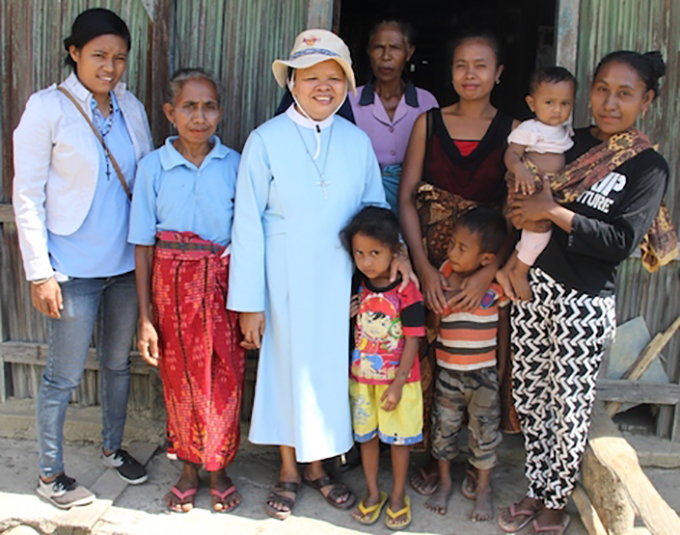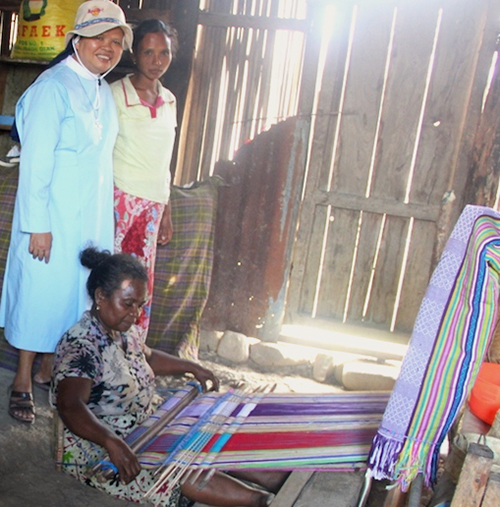
By Konradus Epa in Atambua, Indonesia
Rostiana Bareto experienced tough living conditions as a refugee when she and her family settled in Atambua, western Timor, on the border with Indonesia.
Despite the fundamental challenge of making ends meet, 49-year-old Bareto and her husband decided to stay and avoid the political instability back home.
More than 250,000 people fled Timor-Leste or were forcibly transferred west following violence that escalated around an independence referendum, August 30, 1999.
The initial attacks on civilians by anti-independence militants expanded to general violence throughout the country.
Many returned to Timor-Leste after the declaration of independence in 2002. But about 100,000 people chose to continue their lives in East Nusa Tenggara province, including 60,000 people in Belu regency.
Since her arrival, Bareto, now widowed, has not received any assistance from the government, causing great frustration for her family and many others living in similar conditions.
Their lives began to change when they met Holy Spirit Sister Sesilia Ketut. Seven years ago the nun gave Bareto some money to start her own cloth-weaving business. Working in a group of widows she learned to weave and cook, and make bags, rosaries, flowers and wallets, which were then sold to markets.
Weaving every day
“Every day our job was weaving and we never stopped, although the products were sold at a cheap price,” said the mother of six.

Now, more than 300 widows – whose husbands either died before or after the 1999 conflict – are receiving help from the 59-year-old nun.
Sister Ketut said she decided to work with the widows because she felt moved by their suffering in the early days when they first sought shelter in western Timor.
To help those in Belu regency, Sister Ketut established the Forum for Women and Children in 2000. The forum continues its operations today providing aid to the people in cooperation with non-government organisations such as the Jesuit Refugee Service, UNICEF and Save the Children.
They provide critical support services to domestic violence and rape victims and deliver much-needed education.
Lourdes Clara Dedeus, 23, a former refugee from Timor-Leste who became a volunteer for the forum in 2013 said she helped Sister Ketut because of her noble service to the people.
“I was educated by the nun,” Dedeus said and now she accompanies the nun in helping victims of domestic violence and rape.
Trained in business
According to Sister Ketut, besides helping the widows, she also trains other former refugees in business and education and helps them to reconnect with their relatives back home.
Each year, she offers loans with low interest to more than 30 former refugees. Sadly, only a few people succeed, while others spend the money on parties and other non-essentials.
“Most of them cannot return the money,” she said. “So there’s a need to train them in business.”
In the early years, many children born to former refugees had no access to school in the settlement areas. This inspired the nun to establish early childhood education and development services. “We started the school under trees because there were no facilities,” she said.
When Save the Children joined the fold in 2010, a school house was constructed. Now there are two schools that accommodate more than 60 children.
Yosep Benediktus Lake, chairman of a school committee, said each family has five to eight children and most of them do not go to school.
“The sister has helped the children free of charge but many parents were unaware of the importance of education for their children,” he said.
Reconnecting in Timor-Leste
Every year, dozens of former refugees return to Timor-Leste, and since 2000 the nun has facilitated the return of more than 400 people to their homeland.
“We accompany them until they reunite with their families and they are welcomed with custom rituals and parties,” she said.
But lately, the number of those repatriating to Timor-Leste has decreased due to the high US$384 (NZ$520) fee for administration costs and the long waiting times for passports to be issued.
Bishop Dominikus Saku of Atambua gave high praise, saying “I see her service is good for the former East Timorese refugees and I support her.”
Bareto, who is the head of a community unit, said the local government has also expressed its gratitude to Sister Ketut for her extensive work and commitments to the former refugees.











































